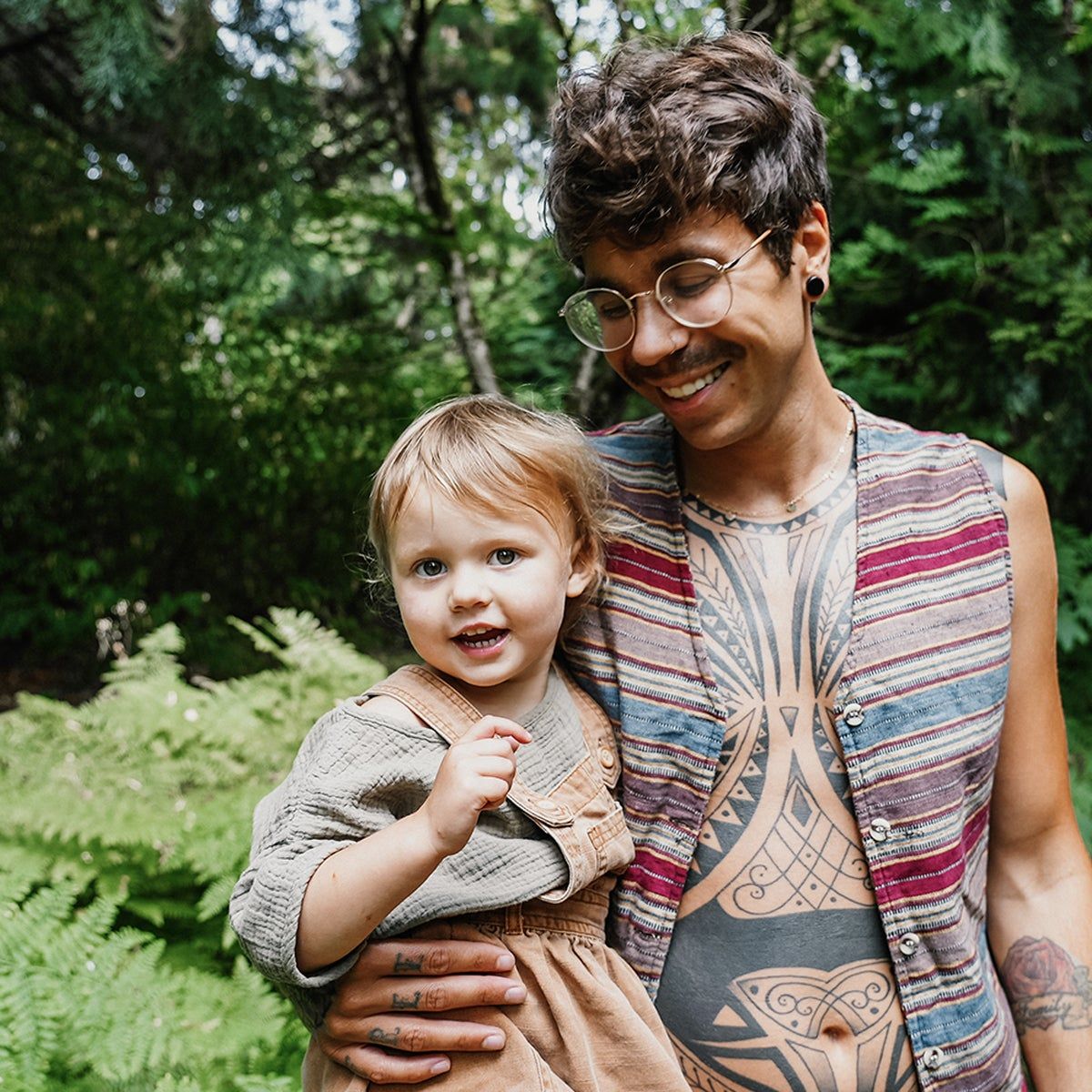
Off the Grid
The Durt Family: Parenting Beyond Gender Stereotypes
- Written By
- Elliot Durt
We have spent this whole summer living in a tent, and this usually means that we have to find a place to cool off during the hottest part of the day. Today, we are standing at the edge of a river. Submerged in an inlet that has been calmed by the placement of some very large boulders that create a sort of pool. Our daughter is two and a half and I am no longer quite sure if it is looked down upon to allow her to be in public without a shirt on, but this was an impromptu stop and we only have her swim diaper. She seems relieved to be free from her usual spandex one piece and scampers to the water’s edge, her dinosaur named Roger in one hand, and her baby doll in the other. I sit in the shade of the tree and watch as she alternates between Roger stomping around and roaring and tending gently to her sleeping baby. But mostly, she just gathers rocks and shows me her favorites.
I usually use this time to daydream, and today while watching Uma, I find myself recalling memories of my childhood and my sister. My sister is my very best friend. Of course like all siblings, we have the funny stories of tormenting and provoking one another, but our childhood is more a tale of friendship. A friendship that has grown and flourished even more as we have become adults and parents. Besides having a built-in best friend, the biggest perk to having a little sister when I was a child was the new toys that it brought into our home. Toys and play objects that were not present when it was just my brother and me. I remember my sister’s birthday parties being so exciting: all of those new pink boxes filled with Barbies and play makeup. Toys that I knew we would play with together. For as much time as I spent in the room my brother and I shared, I spent an equal amount of time in my sister’s room. We would play her Spice Girls CD and ponder which Spice Girl represented each of us best before creating elaborate narratives in our Barbie world.
I didn’t have to do this in secret. I was allowed to play freely with my sister in her room. My parents never shamed me. But of course, they were aware of the social implications of this and were aware before I was of how my peers might handle my love of all things “girly.” I remember the first time that my mother had to present me with the choice between acceptance or potential ostracization. I was playing with my sister before school on a fall morning. My grandmother had just sewn a few wardrobe pieces for my sister’s Barbie, and I was creating all sorts of new outfit combinations. My classmate Tyler who lived down the street was about to arrive, so we could ride our bikes to school, a private Catholic elementary school right down the street. My mother, trying to be very gentle with her words said, “You can keep playing with the Barbie, but Tyler might make fun of you or tell your friends. Maybe you would just rather play with the Barbies in private?” I could see the sadness in her eyes. She was trying to protect me and with that protection came the projection of shame. From that moment on, I knew that I must keep this part of me very, very secret from the outside world.
I found other interests, or found more covert ways to keep my more “girly” interests. I took up art and loved drawing beautiful women in elaborate gowns. As puberty struck, I realized that not only were my interests different, but a major part of my identity differed from my peers. In high school, I came out as gay which allowed me to be more effeminate and simply be understood as flamboyant, and eventually I became a hairdresser which allowed me to be in a female-dominated space most of the time.
I was able to find a way to exist comfortably in this dichotomy by finding a place of ambiguity in it for myself. It all started to feel less complicated and none of it felt pressing anymore, and I can’t really say I felt consciously suppressed. That is, until my husband Matthew and I were expecting our first child: a daughter. She was still just a frozen embryo when gender stereotypes began being projected onto her. Questions of which shade of pink we would paint the nursery, excitement to buy her dresses. I would give my usual sarcastic response that our bedroom was already painted pink and there could only be one pink room in the house, and that the dresses I was shopping for were for me. On the outside, I used humor, but on the inside, these questions stung. Not because I didn’t actually want to hold space for Uma to be as “girly” as she would like, but because I could see how quickly the world wanted to project these roles and expectations onto her.
These superficial gender projections felt innocent enough and were easy to dodge, but it was when she was born that things seemed to get more complicated. The comments about her being “sassy” or a “diva” even when she was just an infant. Were little boys called these words when they expressed their emotions? When they cried out for comfort? Or when she was six months old and someone observed her body saying, “We need to get you walking so you can lose some of those rolls!” I was always mocked for being such a scrawny boy, so much so that I started to feel uncomfortable without a shirt on. And now my daughter was being criticized for being too big before she could even crawl. Maybe these comments were just passing comments and no harm was meant, but I think we all know the harm done.
Gender roles and stereotypes prevent us from being able to fully express ourselves. They can immediately make us feel like an intrinsic part of who we are is wrong and shameful. They stunt our growth and creativity, they limit our personal choices, and create harmful and unrealistic expectations of how we are allowed to show up as ourselves in the world.
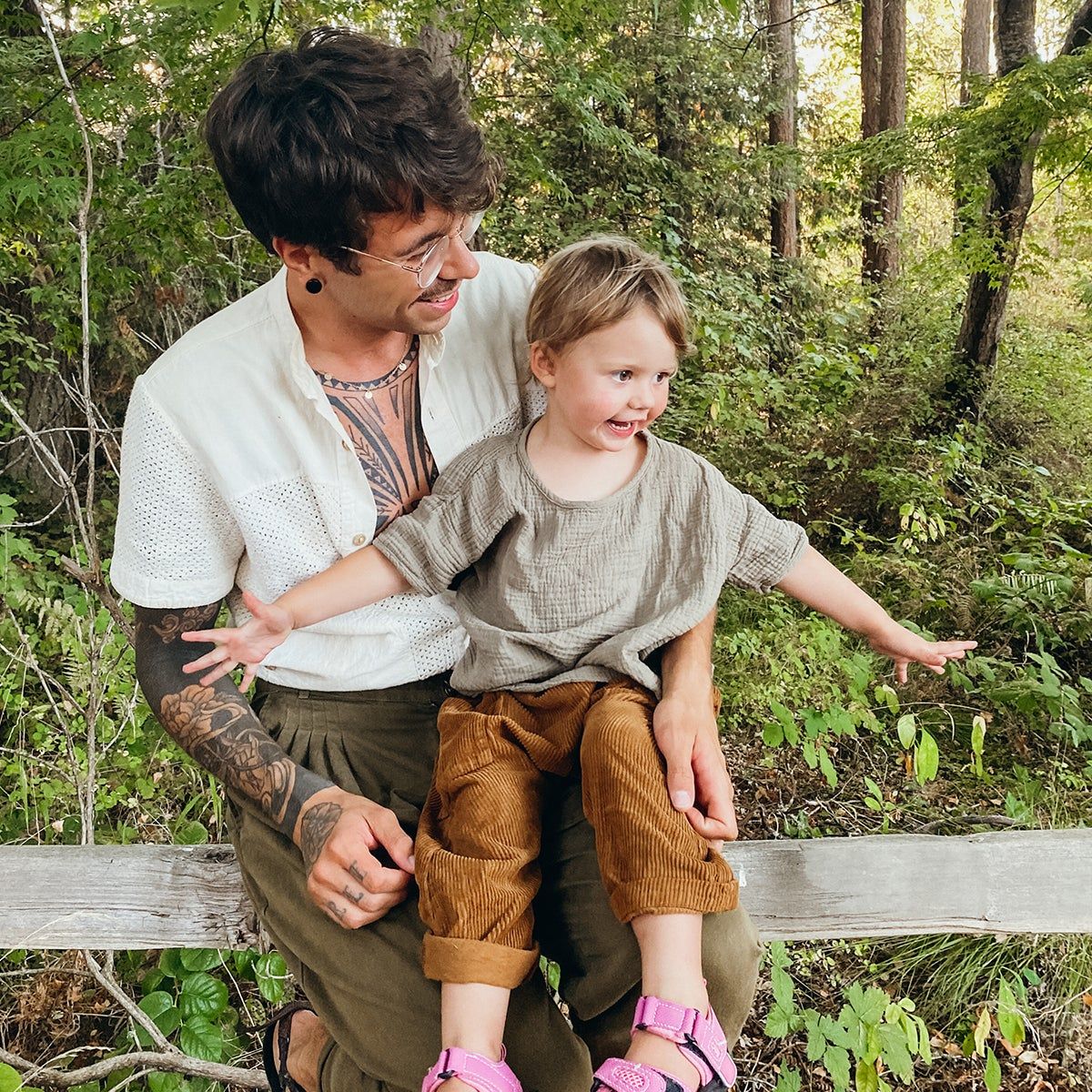
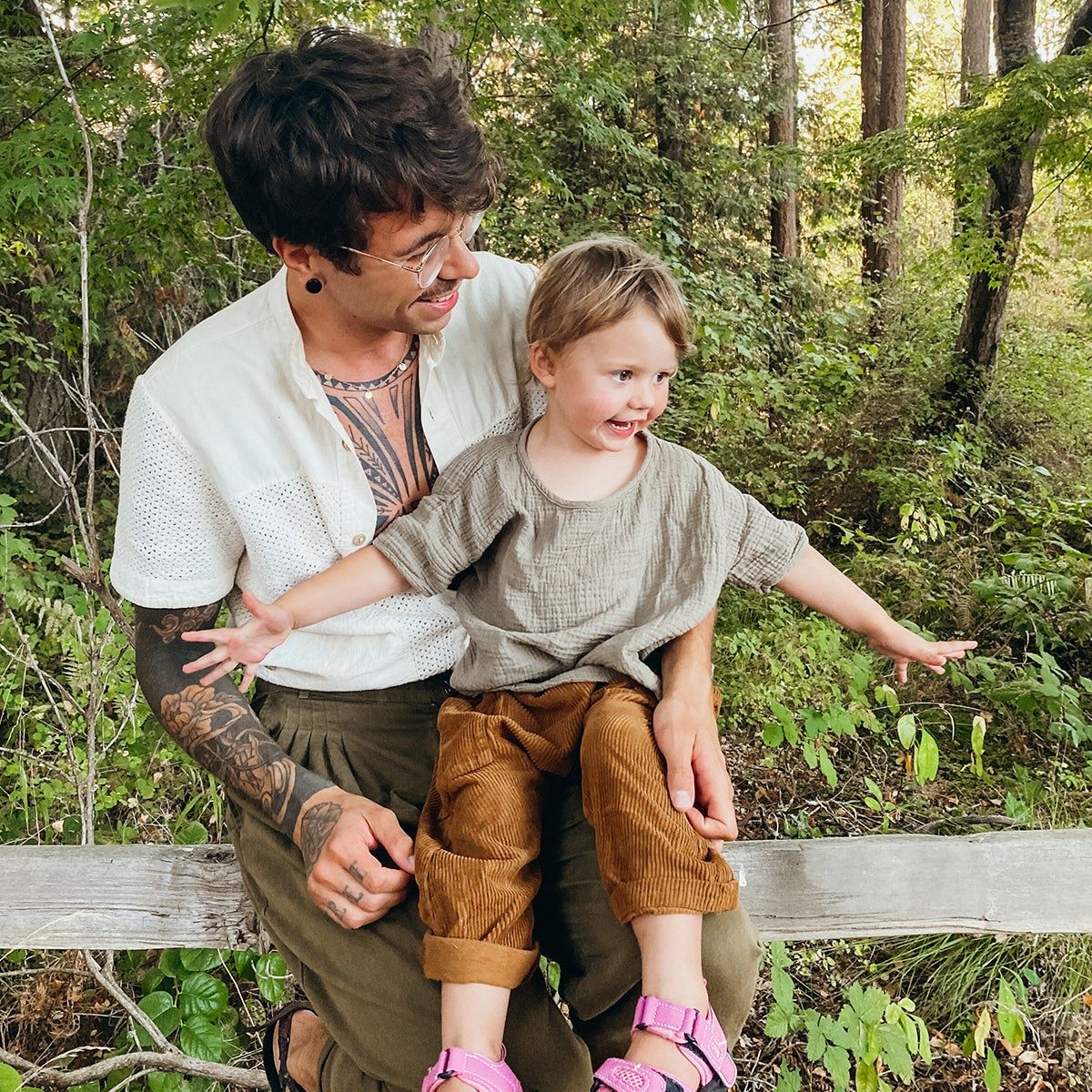
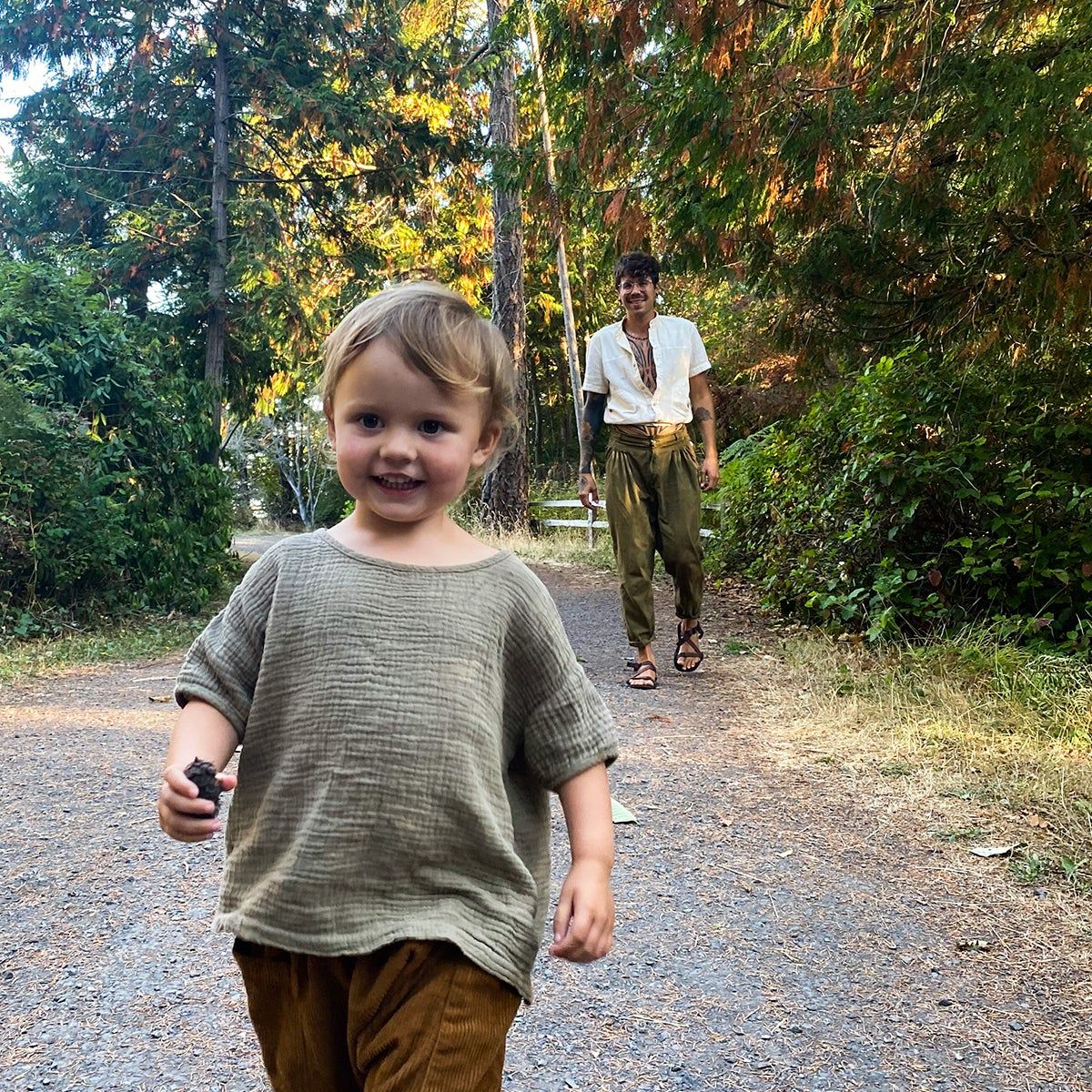
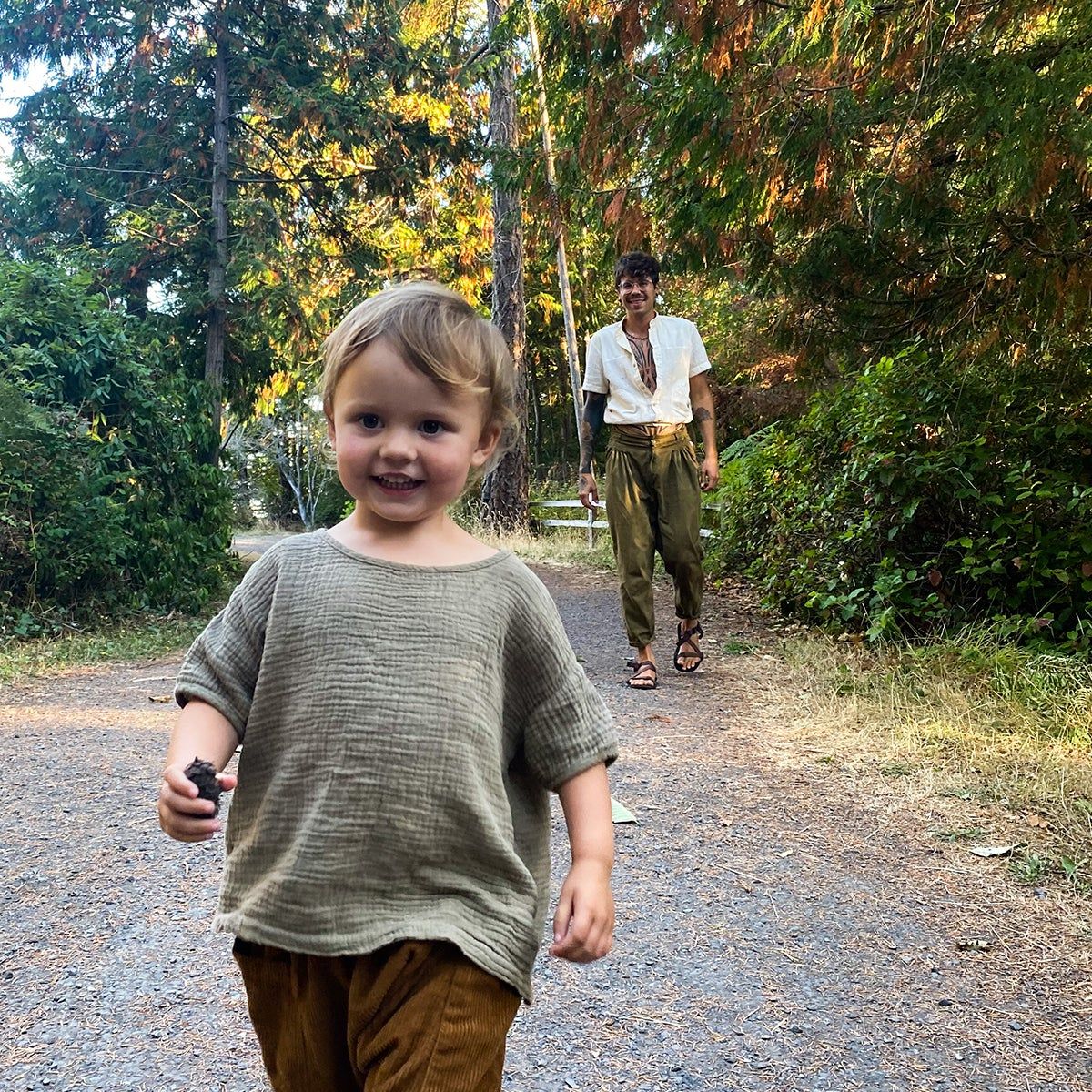
Uma is biologically female, but we try to never allow this to impact how we parent her. We live in our tent, the forests are our playgrounds, and we each have a backpack of simple clothing. In my daughter’s, you will find clothes in shades of cream, brown, black, green, and blue. Pants and dresses. You will also find her favorite pair of pink sandals. In her toy bag, you will find dinosaurs, sharks, wooden fairies, and her collection of babies. If you come to play, she will most likely want to pretend she is a monster to scare you, or she will want to race. When she falls and hurts herself, she jumps right back up and says “I okay!” But if you say that you are hurt, she will tend to your “owie” and check in on it several times a day. She loves chapstick and will put it on and make us admire her “lipstick.” She will wander farther into the dark than even I can before becoming scared.
I know the world will do its work to project onto her these gender stereotypes, and maybe challenging them and facing them head on won’t be a burden she is willing to take on. But as parents, we are committed to doing our best to hold space for her to be her truest, most authentic self. And in this pursuit, I have found myself exploring my own gender again. As I hold space for Uma to be her most authentic self, I find I’m holding the same space for myself. The value of tending to your child in a more gender-neutral way isn’t just something for them. It’s a second childhood for us. It allows us to tend to ourselves in a way that we didn’t always get to experience.
One of the most important things I’ve realized during my parenting journey is this: we don’t have to break our hearts for the protection of our children, we don’t have to internalize the hate. Instead, we can simply choose to love. We can choose to love ourselves, and thus, choose to love our children.
As parents, we have a responsibility to pass on our knowledge to our kin, but this doesn’t mean we are obligated to pass on our pain, our wounds, our fears of rejection. I find myself often reflecting these days: if shame hadn’t made me abandon parts of myself as a young child, how much more wide could my imagination and self-expression be? What hobbies and interests might have emerged given the chance? What might I allow myself to enjoy even now? By exploring these questions, I give myself the chance to expand into a wholly realized person. And by committing to this exploration, I make sure that I never limit my daughter's potential of realizing who she is fully as well. I want her to live a truth outside of the narrow lens of gender stereotypes and expectations. I want her to never feel like part of who she is is intrinsically wrong simply because of her gender. And more than anything, in me, I want her to always have a safe space to navigate this.